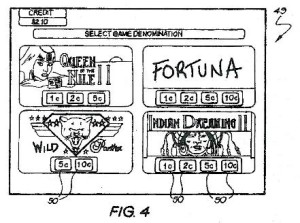On 22 July 2016, IP Australia approved a patent specification involving computer programming in poker machines in Aristocrat Technologies Australia Pty Limited [2016] APO 49.
IP Australia’s decision comes on the heels of the High Court of Australia’s approval of the Full Federal Court decision in Commissioner of Patents v RPL Central Pty Ltd [2015] FCAFC 177 (RPL Central) on 5 May 2016. In that case, the Full Federal Court found that, under Australian law, computer programming was not a ‘manner of manufacture’ if it was simply being used as a means to implement a business method. The Court found that to be patentable the invention must involve the creation of an artificial state of affairs where the computer is integral to the invention, rather than a mere tool in which the invention is performed.
IP Australia now seems to have found a computerised invention that passes the RPL Central test.
Claim 1 of the 646 application
Aristocrat’s 646 application concerned 26 claims, the relevant one being claim 1 for a “gaming machine including a controller and a touch sensitive electronic display“. The controller was “arranged” to display images for multiple games available on a multi-game poker machine, allowing the player to identify and choose between individual games and bet denominations. This is best portrayed by Figure 4 of the specification:
 The question before the Delegate of the Commissioner of Patents was whether the “substance” of the invention was a technological improvement or merely intellectual information presented via a computer.
The question before the Delegate of the Commissioner of Patents was whether the “substance” of the invention was a technological improvement or merely intellectual information presented via a computer.
The decision
The Delegate outlined a number of relevant considerations for computerised inventions to qualify for patent protection, derived from RPL Central and Research Affiliates LLC v Commissioner of Patents [2014] FCAFC 150. These include:
- does the invention comprise more than an abstract idea, mere scheme or mere intellectual information?;
- does the invention solve a technical problem within the computer or outside the computer?;
- does the invention result in improvement in the functioning of the computer, irrespective of the data being processed?;
- can the invention be broadly described as an improvement in computer technology?;
- is the computer merely an intermediary or tool for performing the method while adding nothing of substance to the idea?;
- does the invention involve steps that are foreign to the normal use of computers?; and
- does the invention lie in the generation, presentation or arrangement of intellectual information?
The Delegate found that Aristocrat’s claimed poker machine was patentable because:
- the substance of the invention was independent of the game being played, and preceded the playing of the game;
- the computer was not merely an intermediary to carry out a business method; and
- the poker machine was the invention of which the computer programming was part of, and central, to the claimed machine and method.
A question of “substance”
Improved computer programming in gaming machines will not always lead to a patentable invention – IP Australia in fact rejected such claims in Konami Gaming, Inc. [2016] APO 46 because the invention related to gameplay and did not materially affect the machine itself.
The Aristocrat case is likely to be seen as a test case for IP Australia’s interpretation of the Court’s patentability rules as set out in RPL Central.
________________________
To make sure you do not miss out on regular updates from the Kluwer Patent Blog, please subscribe here.


